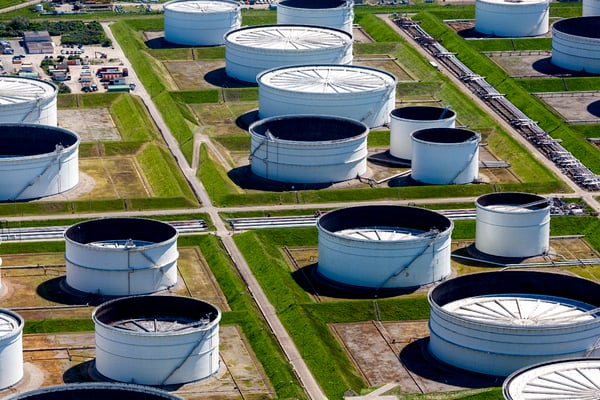Contact us
Get in touch with our experts to find out the possibilities daily truth data holds for your organization.
Persistent Monitoring
Natural catastrophe solutions
21 October 2021 | Data
7 min read
Driven business leader committed to providing end users with dependable, decision quality SAR insights at the speed of change.

Oil inventory is very critical information as it shows the balance of supply and demand in the market, which directly influences price. Constantly updated information on global oil inventories is of enormous relevance.
ICEYE's capability to monitor areas on a daily basis using synthetic-aperture radar (SAR) technology opens a new level of high-frequency updates on events happening on Earth. In the case of monitoring the world’s oil reserves, the data we provide can be used to conduct daily analysis of oil production and consumption. This leads to new insights as it takes into account the pace of change.
This blog demonstrates how ICEYE’s Daily Coherent Ground Track Repeat (GTR) imagery can contribute to meeting this high need for frequent updates on global oil inventories. And it includes confirmation from our partner, Ursa Space Systems, a recognized expert in oil inventory reports derived from satellite images, of the unique benefits that having imagery available for daily analysis brings to the oil market.
Economic growth is one of the most important factors affecting the demand for oil products, as growing economies always increase the demand for energy. Having knowledge about inventory trends, whether they are increasing or decreasing, helps determine trading strategies and pricing. Estimating current oil reserves around the world and forecasting changes in production are essential to making strategic decisions about the procurement and transportation of oil.
To do just that, the Energy Information Administration (EIA), for example, publishes weekly a Petroleum Status Report reporting the inventory changes of commercial crude oil held by US firms. The Organization of the Petroleum Exporting Countries (OPEC) releases the averaged oil prices of various OPEC members on a daily basis as a benchmark for monitoring the global oil price and the stability of the oil market.
For fair pricing and trade, however, the global oil market would have to be entirely transparent, which is not the case. There are places in the world where official oil stocks are not reported, and several oil-producing countries even try to hide their production, consumption and storage figures to avoid disadvantages in negotiations in the oil market. This may adversely affect the trade of other nations.
It is crucial for the industry and the world to find a way to become independent of the reporting behavior of individual countries. Earth observation (EO) satellite imagery is already a proven source for the regular mapping of oil reserves around the globe. And ICEYE’s capability to deliver reliable, near real-time data on reserve stocks finally enables the level of transparency needed to achieve this important goal.
As remote sensing sensors cannot “see” through walls and roofs, the volume of oil in storage tanks can only be measured if it is an above-ground tank with an external floating roof. This type of tank is designed to store large quantities of crude oil. The roof floats on the surface of the oil, rising and falling with the volume of the oil in the tanks to reduce the vapor space above the oil level. The height of the roof is linked to the filling volumes in the tanks.

Figure 1. Oil tanks with floating roof
By measuring the height and perimeter of the floating tanks as well as certain other tank dimensions, the storage volume can be reliably calculated.
The quality and high-resolution and the frequent availability of the satellite data is key to achieving steady oil storage inventories. And that requires a highly-flexible satellite constellation with a rapid repeat cycle, fast tasking procedures, immediate data downlink after acquisition, efficient data processing, quality control, and fast data delivery to the customer. ICEYE now delivers all of this.
Up until now, only weekly updates of oil tank stocks based on satellite data have generally been available, despite the fact that the volume of the oil tanks changes daily. It’s clear that there is great demand for daily access to satellite imagery of oil reserves. This information massively impacts price levels and enables much more accurate prognoses on how the market will react. But it’s never been possible – until now.
The oil consumption or production of a refinery can be effectively monitored with ICEYE's agile SAR satellite constellation, which is designed to rapidly revisit any area on the globe daily, or even multiple times a day. The captured images are provided to customers within hours, as rapid access is one of the most important parameters for persistent monitoring projects.
ICEYE’s newly demonstrated, world’s first capability of Daily Coherent Ground Track Repeat (GTR) imagery delivers images with the same geometry every 24 hours. Because SAR technology enables the collection of data regardless of weather conditions, day and night, continuous time-series can be created. These series facilitate the detection of area and object changes. Objects that have not changed during the monitoring period look exactly the same every day. Objects that have changed can be identified and analyzed.
This makes the Daily Coherent GTR imagery ideal for monitoring oil tanks with floating roofs and analyzing volume changes objectively and transparently to infer trends in oil storage.
“Traditional oil storage data is often outdated, limited to a few locations, and can have variable accuracy. Having access to reliable and consistent imagery of oil tank inventories is key to understanding the changes in the energy supply chain. Daily tank inventories enable us to respond to world events and provide customers with timely updates on what is happening in the oil markets and the global supply.”
- Greg Skotzko, Product Manager at Ursa Space Systems
ICEYE’s Spot imaging mode provides high-resolution information which enables the accurate measurement of tank parameters needed for calculating the volume in a tank.
The daily usage of oil tanks can be seen in the following two examples.
The first example shows above-ground oil tanks with external floating roofs in the Port of Rotterdam, the largest seaport in Europe and the leader in the throughput and storage of crude oil in northwest Europe. The port area is located on the North Sea and is cloudy most of the year. SAR satellite technology is the only source that can guarantee frequent information in these circumstances.
Figure 2 demonstrates the information content of ICEYE’s daily time-series. The images were taken at exactly the same time of day between March 6 and March 28, 2021. The floating roofs of the oil tanks are moving up and down, indicating the supply and withdrawal of oil. By simultaneously monitoring incoming oil tankers, the volume changes in the tanks can be linked to the length of time the vessels stayed at the terminal.
Figure 2. These time-lapsed SAR images show the movements of floating oil tank roofs in the Port of Rotterdam, Netherlands, between March 6 and March 28, 2021, on a daily basis.
This second time-series of images, captured between May 16 and May 23, 2021, shows the daily change in oil volume in the floating roof tanks of Cushing, Oklahoma, a major storage hub for crude oil.
As in the first example, it is of interest to analyze which tanks are in daily use and how big the changes are, and which tanks are not in use at all.
Figure 3. SAR imagery time-series of Cushing oil tank farm over 8 consecutive days acquired between May 16 and May 23, 2021.
The daily observation of locations with SAR imagery taken under the same acquisition geometry at exactly the same time of day reveals a wealth of small changes and processes on any location on Earth. And ICEYE’s Spot imaging mode provides high-resolution information that is ideal for identifying and measuring objects. Together, they allow us to unlock information that has never been available before.
Discover the high quality of ICEYE’s SAR satellite data for your persistent monitoring applications and download the world’s first Daily Coherent Ground Track Repeat Spot dataset:
27 June 2025
Beyond the Echo - Rapid-fire imaging, on repeat
Shikha Sharma and the ICEYE team explore physical maneuver, electronic beam steering, and optimized...
Read more about Beyond the Echo - Rapid-fire imaging, on repeat →13 March 2025
Harness the magical property of SAR
When you combine phase information with persistent monitoring, you can track day-to-day changes...
Read more about Harness the magical property of SAR →14 February 2025
Beyond the Echo - Natalie, Will You Marry Me?
What brings sustainable farming, a creative marriage proposal, and ICEYE's radar satellite...
Read more about Beyond the Echo - Natalie, Will You Marry Me? →